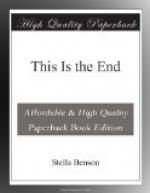“Perhaps one is overworked and the other isn’t,” suggested Kew.
As he went out into the darkness the noise of London sprang into his ears, and the remote brown room where he had left Jay seemed to become divided from him by great distances. The town was like a garden, and he, an insect, pressed through its undergrowth. The rare lamps and the stars flowered above him.
My yesterday has gone, has gone, and left me tired;
And now to-morrow comes and beats upon the door;
So I have built to-day, the day that I desired,
Lest joy come not again, lest peace return no more,
Lest comfort come no more.
So I have built to-day, a proud and perfect day,
And I have built the towers of cliffs upon the sands.
The foxgloves and the gorse I planted on my way.
The thyme, the velvet thyme, grew up beneath my hands,
Grew pink beneath my hands.
So I have built to-day, more precious than a dream;
And I have painted peace upon the sky above;
And I have made immense and misty seas that seem
More kind to me than life, more fair to me than love,
More beautiful than love.
And I have built a House, a House upon the brink
Of high and twisted cliffs,—the sea’s
low singing fills it.
And there my Secret Friend abides, and there I think
I’ll hide my heart away before to-morrow kills
it,
A cold to-morrow kills it.
Yes, I have built to-day, a wall against to-morrow,
So let to-morrow knock, I shall not be afraid,
For none shall give me death, and none shall give
me sorrow,
And none shall spoil this darling day that I have
made.
No storm shall stir my sea. No night but mine
shall shade
This day that I have made.
“We will start on our quest to-morrow,” said Anonyma. “To-day I must work.”
Nobody in Anonyma’s circle was ever allowed to forget that she spent four hours a week in the service of her country. You would never guess how much insight into the souls of the poor, four hours a week can give to a person like Anonyma. She had written two books about the Brown Borough since the outbreak of War. The provincial Press had been much impressed by their vivid picture of slum realities. Anonyma’s poor were always yearning, yearning to be understood and loved by a ministering upper class, yearning for light, for art, for self-expression, for novels by high-souled ladies. The atmosphere of Anonyma’s fiction was thick with yearning.
Anonyma always came home from her Work with what she called “word-vignettes” in her notebook. She gave her Family the benefit of these during the rest of the week, besides fitting them into her books. So that although Cousin Gustus always conscientiously bought a dozen copies of each novel as it came out, he really wasted his money, for he was obliged to know all his wife’s copy by heart before it got into print. By speaking each thought as well as writing it, Anonyma rather unfairly won a reputation twice over with the same material.




